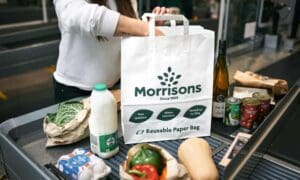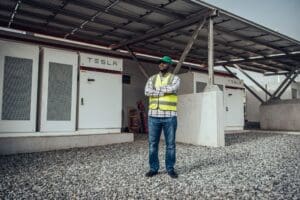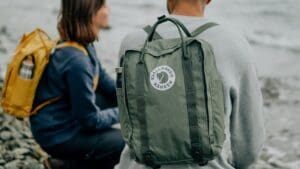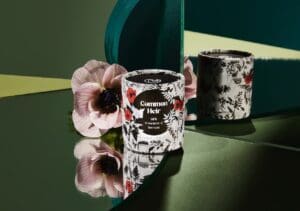In celebration of Earth Day, we are highlighting the latest trend observations and product innovations that showcase businesses and consumer behavior that puts the environment first.
Committed to ending plastic – UK

Grocer Morrisons will end the sale of plastic carrier bags and instead only offer paper and reusable ones made from cotton, jute or other materials to be purchased. The move from the supermarket makes it the first in the UK to commit to ending the sale of plastic bags. It comes after a successful trial in eight stores and will see 200 tonnes of plastic and almost 100 million plastic bags saved each year. The new paper bags can hold up to 16kg and cost 30p. They are reusable, recyclable, water-resistant, tear-resistant and more resilient than previous ones offered. String, jute, cotton and reusable woven bags which cost between 75p and £2.50 are also available. Its bags for life, which the brand revealed it found were often only being used once, will be removed from Scottish stores in April and from English and Welsh stores later in 2021.
Consumers are concerned about the environment and plastic pollution is an issue that many expect brands to be tackling which is seeing many move to plastic alternatives for packaging. This is also driving demand for packaging-free and refillable solutions across all categories from food to BPC. However, not all consumers have the environment top of mind so by making acting in this way convenient, or the only option, it is helping consumers learn new behaviours. It is also showing a brand’s ethical stance which is a key purchasing factor for many consumers.
Solar-powered future – Nigeria

Nigeria is increasingly focusing on a future powered by renewables, particularly solar energy. Under the Paris Climate Agreement Nigeria has pledged to cut carbon emissions by 20% by 2030 so to achieve this it aims to generate 30% of its energy from renewables. The Nigerian federal government’s Rural Electrification Agency of Nigeria aims to harness renewable energy to power infrastructure such as homes, hospitals and schools. This has resulted in the launch of Solar Power Naija, the country’s largest investment in solar energy as part of the country’s COVID-19 recovery plan. Its aim is to roll out 5 million new solar-based connections in communities that are not grid-connected. One example is a 60kWp solar hybrid mini-grid power plant located in the Cross River State.
Despite consumers being keen to support the environment, in order to tackle climate change work has to be done to make access to renewable energy and carrying out other green behaviours more simple. This is being supported by a rise in innovation and development in solar power, and other sustainable energy sources, such as mass rollouts of solar power plants. Brands are enabling consumers to swap to renewables more conveniently through portable devices, more charging stations for green vehicles as well as swapping fossil fuels for renewable energy both in their manufacturing and in the products sold.
Upcycled collection – Sweden

Outdoor clothing brand Fjällräven has launched a new limited-edition collection of clothing and outdoor equipment made from leftover textiles and materials. The collection features items inspired by Fjällräven’s bestselling and classic products, such as backpacks, jackets and caps, but this time made from leftover materials. The goal behind the new Fjällräven Samlaren collection was to reduce industrial waste. The brand plans to continue using excess materials leftover from manufacturing in future Samlaren collections while working to become efficient enough to produce no leftovers at all.
Increasingly aware of the fashion industry’s impact on the environment, consumers are seeking more sustainable alternatives to mass-produced fast fashion items made with resource-intensive materials. In response, brands have begun launching experimental and limited edition collections using upcycled waste materials that are sourced either from their own factories or from other brands. We have seen bags made from upcycled hotel linens and towels, juices, jams, soaps and fragrances made from discarded fruits, and even furniture made with old cigarette butts, demonstrating these circular practices aren’t limited to specific categories.
3D-printed house – Italy

An Italian architecture firm is creating 3D-printed houses from soil. Mario Cucinella Architects have created a dome-shaped house from the earth using 3D printers. The house, called TECLA, which stands for technology and clay, is environmentally friendly as it doesn’t require concrete or transportation to build as it is formed from the earth next to the building site. To build a TECLA, soil is excavated and stones and gravel are removed using a sieve. This is then mixed with water and rice husks to make it solid enough to form walls. The mixture is squeezed through a nozzle by the printer into thin layers to build the walls. The 645 square foot house took around 200 hours to print and the firm plans to build more home designs in the future.
As the population grows, solutions to resource management are being created using technology such as vertical farming and drone deliveries. Cities, in particular, require the effective management of resources, especially affordable and safe housing, to which 3D printing can provide a solution to. Automation is creating ways for these processes to be more efficient and sustainable without human error and utilising materials that are better for the planet. 3D printing is dynamically changing many industries including robotics, fashion and aerospace.
A more sustainable serum – US

Common Heir is a plastic-free skincare brand and its first product uses readily biodegradable capsules. Common Heir describes its products as clean, high-performance, cruelty-free, silicone-free, and plastic-free, and all palm and/or coconut-derived ingredients are RSPO-certified. The brand’s initial product, a Vitamin C serum, comes in a package of individual biodegradable, vegan capsules ($88 for a two-month supply) that can be recycled, composted, or melted down in boiling water to be safely poured down the sink. The capsules are readily biodegradable according to OECD 301F standards.
Common Heir’s current product, and prospective future products, marry innovation with sustainability in order to create a product that theoretically delivers on efficacy and also offers an elevated skincare experience with a portioned out product that’s easy to use, travel with, and dispose of in good conscience. From solid shampoo bars to products made with upcycled agricultural waste, many beauty and personal care brands’ sustainability initiatives affect both the back-end processes as well as the consumer-facing experience. While most consumers are relatively aware of certain changes under the threat of climate change, such as a reduction in plastics, they don’t necessarily know what the more eco-friendly products will look like, and that lack of expectation offers a great opportunity for brand education and innovation.




































